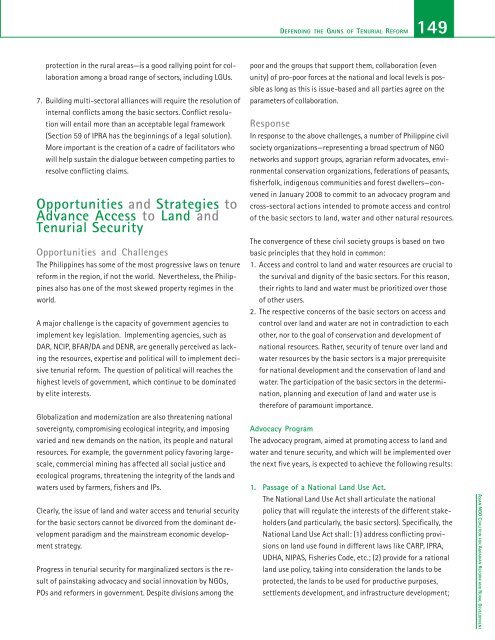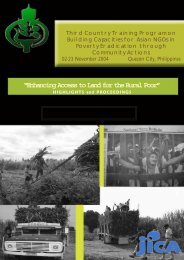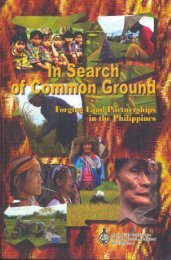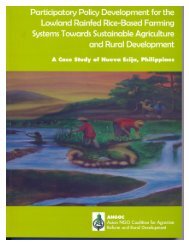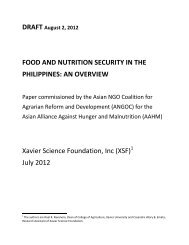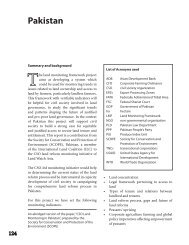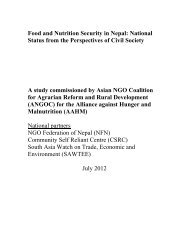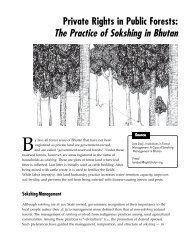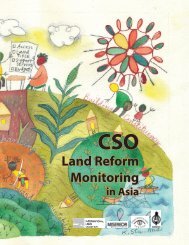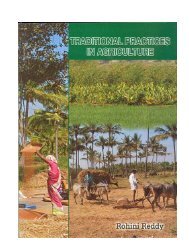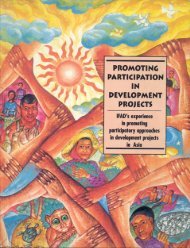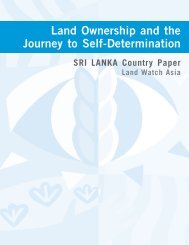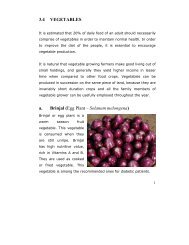Securing the Right to Land FULL - ANGOC
Securing the Right to Land FULL - ANGOC
Securing the Right to Land FULL - ANGOC
Create successful ePaper yourself
Turn your PDF publications into a flip-book with our unique Google optimized e-Paper software.
protection in <strong>the</strong> rural areas—is a good rallying point for collaboration<br />
among a broad range of sec<strong>to</strong>rs, including LGUs.<br />
7. Building multi-sec<strong>to</strong>ral alliances will require <strong>the</strong> resolution of<br />
internal conflicts among <strong>the</strong> basic sec<strong>to</strong>rs. Conflict resolution<br />
will entail more than an acceptable legal framework<br />
(Section 59 of IPRA has <strong>the</strong> beginnings of a legal solution).<br />
More important is <strong>the</strong> creation of a cadre of facilita<strong>to</strong>rs who<br />
will help sustain <strong>the</strong> dialogue between competing parties <strong>to</strong><br />
resolve conflicting claims.<br />
Opportunities and Strategies <strong>to</strong><br />
Advance Access <strong>to</strong> <strong>Land</strong> and<br />
Tenurial Security<br />
Opportunities and Challenges<br />
The Philippines has some of <strong>the</strong> most progressive laws on tenure<br />
reform in <strong>the</strong> region, if not <strong>the</strong> world. Never<strong>the</strong>less, <strong>the</strong> Philippines<br />
also has one of <strong>the</strong> most skewed property regimes in <strong>the</strong><br />
world.<br />
A major challenge is <strong>the</strong> capacity of government agencies <strong>to</strong><br />
implement key legislation. Implementing agencies, such as<br />
DAR, NCIP, BFAR/DA and DENR, are generally perceived as lacking<br />
<strong>the</strong> resources, expertise and political will <strong>to</strong> implement decisive<br />
tenurial reform. The question of political will reaches <strong>the</strong><br />
highest levels of government, which continue <strong>to</strong> be dominated<br />
by elite interests.<br />
Globalization and modernization are also threatening national<br />
sovereignty, compromising ecological integrity, and imposing<br />
varied and new demands on <strong>the</strong> nation, its people and natural<br />
resources. For example, <strong>the</strong> government policy favoring largescale,<br />
commercial mining has affected all social justice and<br />
ecological programs, threatening <strong>the</strong> integrity of <strong>the</strong> lands and<br />
waters used by farmers, fishers and IPs.<br />
Clearly, <strong>the</strong> issue of land and water access and tenurial security<br />
for <strong>the</strong> basic sec<strong>to</strong>rs cannot be divorced from <strong>the</strong> dominant development<br />
paradigm and <strong>the</strong> mainstream economic development<br />
strategy.<br />
Progress in tenurial security for marginalized sec<strong>to</strong>rs is <strong>the</strong> result<br />
of painstaking advocacy and social innovation by NGOs,<br />
POs and reformers in government. Despite divisions among <strong>the</strong><br />
DEFENDING THE GAINS OF TENURIAL REFORM<br />
149<br />
poor and <strong>the</strong> groups that support <strong>the</strong>m, collaboration (even<br />
unity) of pro-poor forces at <strong>the</strong> national and local levels is possible<br />
as long as this is issue-based and all parties agree on <strong>the</strong><br />
parameters of collaboration.<br />
Response<br />
In response <strong>to</strong> <strong>the</strong> above challenges, a number of Philippine civil<br />
society organizations—representing a broad spectrum of NGO<br />
networks and support groups, agrarian reform advocates, environmental<br />
conservation organizations, federations of peasants,<br />
fisherfolk, indigenous communities and forest dwellers—convened<br />
in January 2008 <strong>to</strong> commit <strong>to</strong> an advocacy program and<br />
cross-sec<strong>to</strong>ral actions intended <strong>to</strong> promote access and control<br />
of <strong>the</strong> basic sec<strong>to</strong>rs <strong>to</strong> land, water and o<strong>the</strong>r natural resources.<br />
The convergence of <strong>the</strong>se civil society groups is based on two<br />
basic principles that <strong>the</strong>y hold in common:<br />
1. Access and control <strong>to</strong> land and water resources are crucial <strong>to</strong><br />
<strong>the</strong> survival and dignity of <strong>the</strong> basic sec<strong>to</strong>rs. For this reason,<br />
<strong>the</strong>ir rights <strong>to</strong> land and water must be prioritized over those<br />
of o<strong>the</strong>r users.<br />
2. The respective concerns of <strong>the</strong> basic sec<strong>to</strong>rs on access and<br />
control over land and water are not in contradiction <strong>to</strong> each<br />
o<strong>the</strong>r, nor <strong>to</strong> <strong>the</strong> goal of conservation and development of<br />
national resources. Ra<strong>the</strong>r, security of tenure over land and<br />
water resources by <strong>the</strong> basic sec<strong>to</strong>rs is a major prerequisite<br />
for national development and <strong>the</strong> conservation of land and<br />
water. The participation of <strong>the</strong> basic sec<strong>to</strong>rs in <strong>the</strong> determination,<br />
planning and execution of land and water use is<br />
<strong>the</strong>refore of paramount importance.<br />
Advocacy Program<br />
The advocacy program, aimed at promoting access <strong>to</strong> land and<br />
water and tenure security, and which will be implemented over<br />
<strong>the</strong> next five years, is expected <strong>to</strong> achieve <strong>the</strong> following results:<br />
1. Passage of a National <strong>Land</strong> Use Act.<br />
The National <strong>Land</strong> Use Act shall articulate <strong>the</strong> national<br />
policy that will regulate <strong>the</strong> interests of <strong>the</strong> different stakeholders<br />
(and particularly, <strong>the</strong> basic sec<strong>to</strong>rs). Specifically, <strong>the</strong><br />
National <strong>Land</strong> Use Act shall: (1) address conflicting provisions<br />
on land use found in different laws like CARP, IPRA,<br />
UDHA, NIPAS, Fisheries Code, etc.; (2) provide for a rational<br />
land use policy, taking in<strong>to</strong> consideration <strong>the</strong> lands <strong>to</strong> be<br />
protected, <strong>the</strong> lands <strong>to</strong> be used for productive purposes,<br />
settlements development, and infrastructure development;<br />
ASIAN NGO COALITION FOR AGRARIAN REFORM AND RURAL DEVELOPMENT


